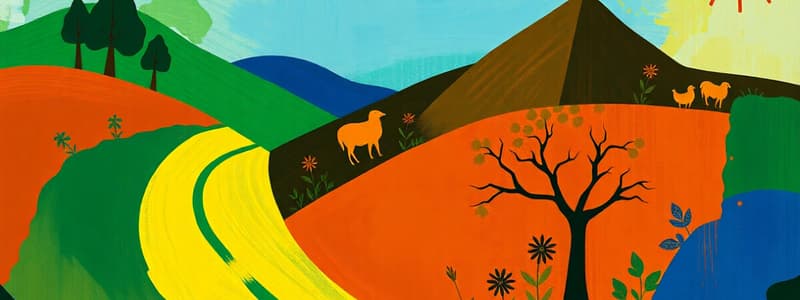Podcast
Questions and Answers
Which of the following classifications of resources refers to living and non-living entities in our environment?
Which of the following classifications of resources refers to living and non-living entities in our environment?
- Development
- Exhaustibility
- Origin (correct)
- Ownership
What is the primary emphasis of sustainable development?
What is the primary emphasis of sustainable development?
- Commercial exploitation of all available resources
- Resource conservation for present and future generations (correct)
- Ignoring future needs for current consumption
- Maximizing resource use for immediate needs
Which of the following stages is not a part of resource planning for sustainable development?
Which of the following stages is not a part of resource planning for sustainable development?
- Immediate exploitation of natural resources (correct)
- Planning with appropriate technology
- Identifying resources
- Matching plans with development goals
Which factor is primarily responsible for land degradation in India?
Which factor is primarily responsible for land degradation in India?
What is a common method for conserving soil resources?
What is a common method for conserving soil resources?
Flashcards
Resource Classification
Resource Classification
Categorizing resources based on origin, exhaustibility, ownership, and development stage.
Renewable Resource
Renewable Resource
A resource that can be replenished naturally over time.
Sustainable Development
Sustainable Development
Meeting current needs without compromising the ability of future generations to meet their own needs.
Land Degradation
Land Degradation
Signup and view all the flashcards
Resource Planning Stages
Resource Planning Stages
Signup and view all the flashcards
Study Notes
Chapter Overview: Resources and Development
- Resources are available in the environment and used to satisfy human needs.
- Resources are classified by origin (biotic/abiotic), exhaustibility (renewable/non-renewable), ownership (individual/community/national/international), and development (potential/developed/stock/reserves).
- Overuse and misuse of resources lead to ecological crises like global warming and ozone depletion.
- Sustainable development prioritizes resource conservation to meet current needs without harming future generations.
- Resource planning is crucial for sustainable development; it involves identifying resources, planning with appropriate technology and institutions, and matching plans with development goals.
Land Resources
- India has diverse land resources (plains, plateaus, mountains).
- Land degradation from deforestation, overgrazing, and industrial activities is a concern.
Soil as a Resource
- Soil formation is a natural process taking time.
- Important soil types in India include alluvial, black, red, and laterite soils.
- Soil conservation methods include contour ploughing, terrace farming, and afforestation.
General Conclusion
- Efficient resource use and proper planning are needed for ecological balance and sustainable development.
Studying That Suits You
Use AI to generate personalized quizzes and flashcards to suit your learning preferences.
Related Documents
Description
This quiz covers the classification and importance of various resources in the environment, their sustainable management, and the challenges posed by resource overuse and degradation. It emphasizes the significance of planning and conservation for sustainable development while highlighting India's diverse land resources. Test your understanding of these crucial concepts.




